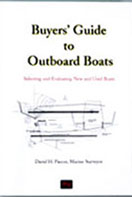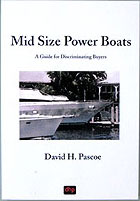Chapter 1
Excerpt
Unlike most marketing media that hype boating with visions of paradise, eternal fun-in-the-sun pictures of bright, sunny days, calm waters and coconut palm studded white sand beaches with the ubiquitous scantily-clad mermaids somewhere nearby, this book is going to present you with a more realistic view of boat buying and ownership.
We start with the fact that it involves considerable responsibility and financial resources, plus elements of risk in the activity itself. If you are adverse to risk taking, perhaps you might want to rethink your desire to become a boat owner.
One of the things that has long attracted so many people to boating in the past is the sense of adventure and the presence of danger. Without the element of risk, many would find boating as boring as driving a car on a crowded road. After all, that's one of the things we seek to get away from.
What Are the Risks?
The dangers of operating a boat are often not obvious. Unlike driving a car, a boat floats on a fluid, water, which can be shallow or deep, clear or murky, moving or not moving.
Dangers include running aground, getting caught in storms, becoming lost, and becoming stranded due to engine failure or running out of fuel. There is also the risk of sinking resulting from striking a submerged or floating object, as well as the failure of some internal plumbing component.
With a car, you can park it in a driveway or garage and more or less forget about it. Not so with a boat, for a boat left unattended for long periods of time while afloat may sink, or at the least will deteriorate at a rate that is disconcerting, for boats require a substantial amount of care.
The newcomer to boating should be aware that despite all our high technology and the fairly good safety record of boat builders, to go boating safely one still needs certain knowledge and skills.
The need to learn something about seamanship has not disappeared. Seamanship is not just a term that applies to ships on the high seas; it also refers to the skill needed to operate vessels safely on rivers, lakes and bays where storms, wind and waves may not be the only danger.
Another important factor goes beyond yourself. As boat owner and operator, you are responsible for the safety of your passengers.
That means that if you don't know what you're doing, you can be held liable for your mistakes that end up in injury to others. There is a very good reason why, in days of old, the captain of a ship possessed the powers of a sovereign: Ultimately he is responsible for the ship and its passengers since, while in the midst of the ocean he cannot call upon the services of a policeman.
In the immediacy of a crisis, all decisions are his to make, including the taking of all actions to ensure safety. Thus, the responsibilities of boat ownership are greater than for any other type of vehicle you could own.
Many boat owners attempt to forgo the effort it takes to learn how to read and use charts, and navigation aids which are the mariners "road maps". This lack of knowledge is most often the cause of running boats aground, which can damage the hull and engines.
In addition to nautical charts, the intelligent boater also learns to read the weather. He knows by experience the very serious dangers of getting caught in severe weather.
(Additional spaces are added for easy screen reading.)
Table of Contents: Chapter 1
What
Are the Risks?
Seaworthiness
Are You a Candidate for a Being Happy Boat Owner?
Why Are Boats So Damned Expensive?
Some Interesting Numbers
The Nature of the Industry
Dealerships
National vs. Regional Builders
Buying Philosophy
On Quality and Reliability
What Does Quality Mean?
Small Boat Management
New -vs- Used Boats
Should You Get a Professional Survey?
 Buyers' Guide to Outboard Boats
Buyers' Guide to Outboard Boats - Selecting and Evaluating New and Used Boats
by David H. Pascoe
Soft Cover
272 pages
Publisher: D. H. Pascoe & Co., Inc.
Published: 2002
Language: English
ISBN-10: 0965649628
ISBN-13: 9780965649629
In Stock
HOME >
David Pascoe - Biography
David Pascoe is a second generation marine surveyor in his family who began his surveying career at age 16 as an apprentice in 1965 as the era of wooden boats was drawing to a close.
Certified by the National Association of Marine Surveyors in 1972, he has conducted over 5,000 pre purchase surveys in addition to having conducted hundreds of boating accident investigations, including fires, sinkings, hull failures and machinery failure analysis.
Over forty years of knowledge and experience are brought to bear in following books. David Pascoe is the author of:
- "Mid Size Power Boats" (2003)
- "Buyers’ Guide to Outboard Boats" (2002)
- "Surveying Fiberglass Power Boats" (2001, 2nd Edition - 2005)
- "Marine Investigations" (2004).
In addition to readers in the United States, boaters and boat industry professionals worldwide from over 70 countries have purchased David Pascoe's books, since introduction of his first book in 2001.
In 2012, David Pascoe has retired from marine surveying business at age 65.
On November 23rd, 2018, David Pascoe has passed away at age 71.




Normally orders ship the same day, if placed before 12:00 PM Eastern time.